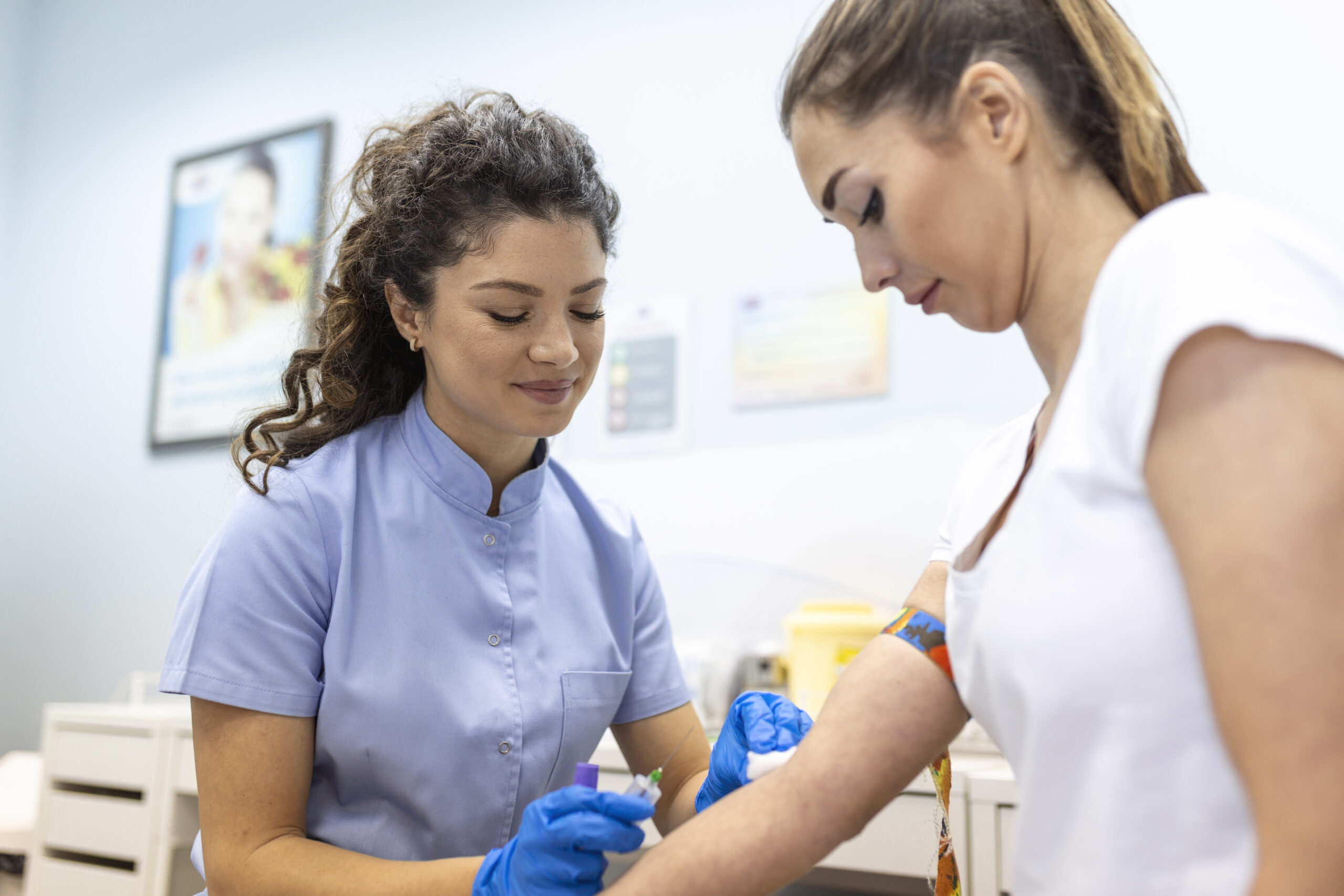
Donating blood is important and takes selflessness, helping to preserve millions of people each year. A lot of people living with diabetes wonder if they can make a safe blood donation. Generally, the answer is positive, but taking special health measures helps keep both people safe.
If you have diabetes and your care includes Avant Medical Group’s comprehensive diabetes treatment, finding out if you can donate blood is important. Blood sugar, drugs you are taking, and healthcare advice are all covered in this article, so you can make a safe and informed choice before giving blood.
Understanding Diabetes and Blood Donation Eligibility
Diabetes is an ongoing condition that upsets the way your body manages blood sugar (glucose) levels. Looking after your diabetes, with a healthy way of living, medicine, and expert support from Avant Medical Group, will influence whether you are able to donate blood safely.
The rules at blood donation centers are set to keep both the giver and recipient safe. A variety of centers permit diabetics to donate blood when certain requirements are met.
● There is no issue with blood sugar fluctuations.
● There are no infections or acute illnesses in your system while you donate.
● There have been no diabetes-related complications, such as wounds, infections, or admissions to the hospital, for you recently.
● You fit the needed age, weight, and general health donation factors.
If you get specialized help with diabetes, such as at Avant Medical Group, it is more likely that your diabetes will remain stable, making you eligible to donate blood.

Types of Diabetes and How They Affect Donation Eligibility
Having either Type 1 or Type 2 diabetes may change your health and your ability to give blood.
● Type 1 Diabetes: It allows for blood donation if your glucose levels are steady and you are generally well managed by a doctor.
● Type 2 Diabetes: reliant on medicines or lifestyle adjustments needs to make sure their blood sugar stays managed before giving blood.
For both options, unmanaged diabetes and conditions like neuropathy, retinopathy, or problems with the heart may stop someone from donating, at least temporarily. Monitoring by specialists at Avant Medical Group allows for changes in treatment, which can help avoid serious problems.
Diabetes Medications and Blood Donation
You are usually able to donate blood if you use medicines for diabetes such as insulin or metformin. At the same time, it’s worth noting:
● Always provide the center with information about your diabetes drugs and overall health.
● Some medications that don’t have to do with diabetes may result in a postponement.
● To find out if undergoing treatment helps you donate, see your doctor at Avant Medical Group first.
Honestly discussing your medications keeps you safe and helps prevent issues with the blood supply.
Preparing for Blood Donation as a Diabetic
If you have diabetes under control, giving blood is usually fine, but taking steps to prepare is still necessary. Use these steps to make your trip easy and safe:

Monitor Your Blood Sugar:
Before you give blood and after, take your blood glucose reading. Donating blood can sometimes decrease a person’s blood glucose. Should you be unsure, get advice from your providers at Avant Medical Group so you don’t go over the safe mark.
Stay Hydrated:
Start drinking water the day before your exam and keep taking it afterward. Drinking enough water helps your blood pressure and stops you from feeling dizzy. If this has been an issue before, a Hypertension Specialist can help ensure your blood pressure stays stable during donation.
Eat a Balanced Meal:
It’s best not to donate if you haven’t eaten anything. For stable blood sugar, eat an on-time meal that has some complex carbs, lean proteins, and nutritious fats 2–3 hours before your appointment.
Avoid Caffeine and Sugary Drinks:
Stick to drinking water rather than sodas or coffee, which may both increase your blood sugar and make you thirsty.
Get Enough Rest the Night Before:
If you have enough rest, your body can handle the stress from donating. If you are feeling a bit sick or worn out, move your classes to another time.
Inform the Staff:
Tell the team caring for you about your diabetes and the drugs you are using. It allows their detection systems to check on you safely during your medical process.
Post-Donation Care:
Taking rest after donating is a good idea. Eat a snack that will settle your blood sugar, and steer clear of strenuous work for the rest of the day.
Health Benefits and Considerations of Blood Donation for Diabetics
Although most people donate blood because it helps others, being a blood donor can have health benefits that are most valuable to people with diabetes. Though they aren’t a substitute for medical care, using them properly can improve your health:
Reduction in Iron Overload:
For people whose blood has high iron—a common sign in metabolic syndrome and insulin resistance—donating blood can help bring down their iron amounts. As a result, it may help lessen oxidative stress in the body, which has been related to problems such as heart and nerve illnesses linked to diabetes.
Improved Cardiovascular Function:
Experts have suggested that, by donating blood on a regular schedule, you may lower the viscosity (thickness) of your blood, making it easier for your heart to pump. Increased blood circulation and routine EKG monitoring matter a lot for people with diabetes, who often experience complications connected to the heart and poor circulation in their hands and feet.
Motivation to Maintain Healthy Habits:
A lot of blood donors are inspired to make healthy choices after donating. Eating well, having routine health checks, drinking enough water and testing your glucose allow you to both manage diabetes and donate blood safely.
Psychological Benefits:
Feeling good about helping others and having a sense of meaning can reduce a key type of stress—a factor often ignored in controlling blood sugar. Taking part in blood donation to lessen your stress can lift your emotions.
These improvements are usually best for individuals who have their diabetes well in hand. That’s why special care by Avant Medical Group is so important. Thanks to their team, patients are able to manage their disease well, catch any problems early and feel well enough to donate blood.
When Should Diabetics Avoid Donating Blood?
There are times when diabetes patients should put off or avoid donating blood. Failing to obey these warnings may cause issues that harm both your health and the safety of the blood you donate. When someone has diabetes, they should refrain from donating their organ.
Blood Sugar is Poorly Controlled:
Having many episodes of high (hyperglycemia) or low (hypoglycemia) blood sugar means your blood sugar is unsteady. If you donate blood while these conditions exist, fainting, a feeling of weakness, or more serious health consequences could occur during or right after donating.
You Have an Active Infection or Illness:
If you have a cold, the flu, or a urinary tract infection, you should get rid of any signs of infection before you give blood. Since infections strain your immune system, they also increase the risk of problems with donated blood.
There Are Diabetes-Related Complications:
If you’ve just been hospitalized or are challenged by foot ulcers, severe nerve damage, or an eye condition called retinopathy, donating blood could put you at risk for further health problems. Before donating again, these should all be managed by a doctor.
You’re Feeling Unwell on Donation Day:
Even experiencing a little tiredness, dizziness, or nausea is a good reason to reschedule. Having all your symptoms go away is better for your body than forcing exercise before being well.
Avant Medical Group ensures patients get full diabetes care, including checkups and watching for related complications. If you’re not sure if donating is safe for you, talk to their team by scheduling an appointment. They help you determine if you should wait and tell you when to donate safely.
Expert Diabetes Care to Support Your Blood Donation Journey
Doing a good job managing your diabetes helps you stay fit enough to donate blood and avoid harming your health. Your Avant Medical Group diabetes specialists partner with you to develop a plan that helps you keep your blood sugar in check, lowers your risk of complications, and supports your health.
If you need to modify your medications, get help with nutrition, or use advanced devices, Avant Medical Group’s experts will support your steady health for safe blood donation.
Frequently Asked Questions (FAQs)
Ans: in most cases, you will be able to give blood as long as your diabetes specialist, like those at Avant Medical Group, keeps your blood sugar well controlled. However, check with your doctor first before proceeding.
Ans: Because of the possibility of temporary fluctuations just before and just after blood donation, blood sugar levels must be closely monitored during and after the event.
Ans: People with diabetes are offered the same intervals for donation as people without diabetes – generally every 8-12 weeks depending on donation type.
Ans: You should wait until blood sugar becomes better controlled before you donate so that you know you would be safe.
Ans: The risk is very less in such a scenario with proper management and support of diabetes specialists like Avant Medical Group. Conversely, poorly controlled diabetes raises the risk, so regular follow-up is necessary.
Conclusion
Having diabetes does not stop you from being able to donate blood and save others. If a diabetic has controlled blood sugar and no serious problems and is advised by Avant Medical Group, blood donation is safe for them.
Looking after yourself is the most important thing. Getting advice from diabetes experts will help you look after yourself, so donating proudly won’t be difficult.
If you want to know more about managing diabetes and giving blood, visit the diabetes section of Avant Medical Group’s website.
